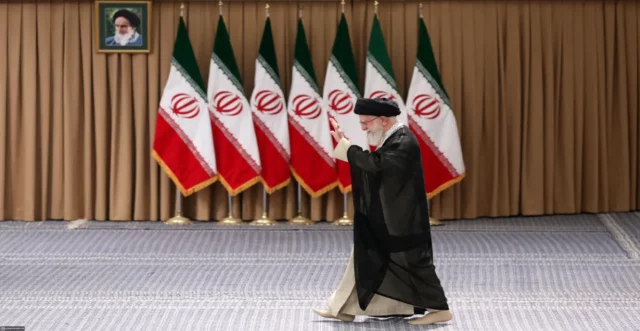Iranians voted on Friday for a run-off presidential election that will test the popularity of the clerical ruler at a time of regional tensions and a standoff with the West over Tehran’s nuclear programme.
State TV said polling stations opened their doors to voters at 8 a.m. local time (0430 GMT). Polling will end at 6 p.m. (1430 GMT), but is usually extended until as late as midnight.
In a fresh development, Iran’s Interior Ministry has extended voting in the election till 8 p.m.
The final outcome will be known on Saturday but initial figures may come out sooner.
The run-off follows a June 28 ballot with historically low turnout, when over 60% of Iranian voters abstained from the snap election for a successor to Ebrahim Raisi, following his death in a helicopter crash.
Critics see the low participation as a vote of no confidence in the Islamic Republic.
The vote is a tight race between low-key lawmaker Masoud Pezeshkian and former nuclear negotiator, Saeed Jalili
While Masoud Pezeshkian is the sole moderate in the original field of four candidates, Saeed Jalili is an ultra conservative politician and diplomat.
The Islamic Republic’s policies are not likely to be impacted much by the election.
The new president will be closely involved in selecting the successor to Ayatollah Ali Khamenei, Iran’s 85-year-old Supreme Leader who calls all the shots on top matters of state.
“I have heard that people’s zeal and interest is higher than in the first round. May God make it this way as this will be gratifying news,” Khamenei told state TV after casting his vote.
Khamenei acknowledged on Wednesday “a lower than expected turnout” last week, but said “it is wrong to assume those who abstained in the first round are opposed to Islamic rule”.
Voter turnout has plunged over the past four years. Critics say that this indicates that support for clerical rule has eroded at a time of growing public discontent over economic hardship and curbs on political and social freedoms.
Only 48% of voters participated in the 2021 election that brought Raisi to power, and turnout was 41% in a parliamentary election in March.
The Interior Ministry spokesman told state TV that early reports indicated “higher participation compared with the same hour in the first round of the election”.
The election coincides with escalating Middle East tensions due to the war between Israel and Iranian allies Hamas in Gaza and Hezbollah in Lebanon, and increased Western pressure on Iran over its fast-advancing uranium enrichment programme.
“Voting gives power …even if there are criticisms, people should vote as each vote is like a missile launch (against enemies),” Iran’s Revolutionary Guards Aerospace Commander Amirali Hajizadeh told state media.
The next president is not expected to produce any major policy shift on the nuclear programme or change in support for militia groups across the Middle East. He can influence the tone of Iran’s foreign and domestic policy.
Faithful Rivals
Election rivals Jalili and Pezeshkian are establishment men loyal to Iran’s theocracy. But analysts said a win by the anti-Western Jalili would signal an even more authoritarian domestic policy and antagonistic foreign policy.
Pezeshkian’s victory might promote a pragmatic foreign policy, ease tensions over now-stalled negotiations with major powers to revive a 2015 nuclear deal. It will also improve prospects for social liberalisation and political pluralism.
However, many voters are sceptical about Pezeshkian’s ability to fulfil his campaign promises as the former health minister has publicly stated that he had no intention of confronting Iran’s power elite of clerics and security hawks.
“I did not vote last week but today I voted for Pezeshkian. I know Pezeshkian will be a lame duck president but still he is better than a hardliner,” said Afarin, a middle-aged owner of a beauty salon in the central city of Isfahan.
Many Iranians have painful memories of the handling of nationwide unrest sparked by the death in custody of young Iranian-Kurdish woman Mahsa Amini in 2022.
“I will not vote. This is a big NO to the Islamic Republic because of Mahsa (Amini). I want a free country, I want a free life,” said university student Sepideh, 19, in Tehran.
The hashtag #ElectionCircus has been widely posted on social media platform X since last week. Some activists at home and abroad called for an election boycott, arguing that a high turnout would legitimise the Islamic Republic.
Both candidates have vowed to revive the flagging economy, which has been beset by mismanagement, state corruption and sanctions reimposed since 2018 after the United States under then-President Donald Trump ditched the nuclear deal.
Delhi based journalist pickled in journalism. Have reported from nine world capitals and almost all parts of India. Over the last three decades, I have worked for India’s mainstream English dailies and contributed to All India Radio, Doordarshan and Women’s Feature Service. Also worked for international media including Japan’s leading newspaper, The Asahi Shimbun and done assignments for The Sunday Times, London, The Telegraph, The Guardian and the Canadian Broadcasting Corporation. Worked in the Embassy of France in New Delhi and can speak French to save my life. Write on Diplomacy, Politics and the social sector. Love Nature, heritage, Nature, animals and vintage cars. Enjoy cycling and playing badminton.





